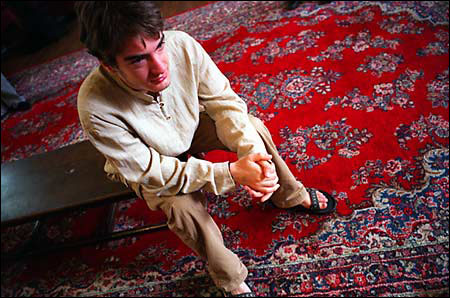Abu Ghraib onstage
Multimedia theatrical piece tries to make sense of prison abuse

Since the theater’s beginnings in ancient Greece, playwrights have used the stage to explore complex ethical issues and portray disturbing current events. It is a practice that continues into the present day with works like Athol Fugard’s “Master Harold … and the Boys” and Tony Kushner’s “Angels in America.”
On May 12, the Loeb Experimental Theatre will premier a work by a Harvard undergraduate that carries on that tradition. “Abu Ghraib,” written and directed by sophomore Currun Singh, probes the meaning of the 2004 prisoner abuse scandal using a combination of dialogue, film, music, and dance.
Singh, a social studies concentrator who has participated in student theatrical productions both onstage and behind the scenes since his freshman year, said that the idea for a play based on Abu Ghraib evolved out of the shock and dismay he and fellow students felt as the news story unfolded. His concern about human rights and about tensions in the Middle East also contributed to the creative ferment, as did his desire to work on a production that dealt with more serious issues.
“I wanted it to be a serious piece,” he said, “a call to action.”

Singh soon found a team of collaborators to join him in this risk-taking venture, among them fellow sophomore Xin Wei Ngiam, also a social studies concentrator, who agreed to produce the play. Like Singh, Ngiam found the revelations about events at Abu Ghraib extremely disturbing.
“On one level I was just appalled. I was just feeling pure shock and horror. But on another level, I was wondering, how could people do those things?” Ngiam said.
The question of how ordinary people can commit unspeakable acts became one of the central issues not only for Singh and Ngiam but for all the students working on the production. Through group discussions and rehearsals, the play developed and changed, propelling the participants through a rollercoaster ride of feelings.
“In rehearsal we tried to simulate what had happened, and sometimes it just ended up being funny, obviously because this wasn’t the real thing, it was just a play. The experience could be very confusing and disturbing,” Singh said.
In the play, characters based on real Abu Ghraib military personnel whose names have since become well known – people like Spc. Charles Graner, Pvt. Lynndie England, and Brig. Gen. Janis Karpinski – talk casually amongst themselves and intimidate and humiliate the Iraqi prisoners. But the play does what neither the leaked photos, the media reports, nor the military trial have been able to do – namely, to apply invented but plausible identities to the anonymous Iraqi torture victims whose naked bodies have become all-too-familiar over the past year.
‘Abu Ghraib,’ an original piece written and directed by Currun Singh, dance directed by Marin Orlosky, produced by Xin Wei Ngiam. Performances May 12-14, Loeb Experimental Theater, Loeb Drama Center, 64 Brattle St. Tickets are free and can be reserved at the Loeb Drama Center Box Office (617) 547-3800.
In key scenes, the prisoners talk about their past lives, how and why they were captured, and how their consciousness has been changed by the treatment they have received. In some respects, these are the most moving and revelatory scenes in the play because they remind us that these unfortunate individuals have families, friends, careers, personal histories, and, above all, human feelings.
Another element that engages the audience emotionally as well as providing a narrative thread is the gradual moral awakening of Specialist Joseph Darby, the soldier responsible for leaking the incriminating photos to military investigators.
Singh and his colleagues made a decision that even the most honest and explicit dialogue could not do justice to the emotions aroused by Abu Ghraib. This is why they have incorporated the element of dance into the production.

“We thought that dance might be the most effective way of expressing feelings about these events. Dance can bring out visceral emotions that words can’t,” said Singh.
Singh, a first-time director and playwright, acknowledges that the production could not have reached its present state without the help of the Denver-based group Show-Up Productions, dedicated to fostering political theater among youth communities.
“They’ve been terrific at raising money, giving us advice, helping us mold the characters, and mentoring me in my first effort at script writing and directing,” said Singh.
How will Singh know if he’s succeeded? He has a pretty good idea of the effect he wants his production to have on the audience.
“If they come out slightly uncomfortable, shocked, and motivated to action, that will be what we’re aiming for.”




